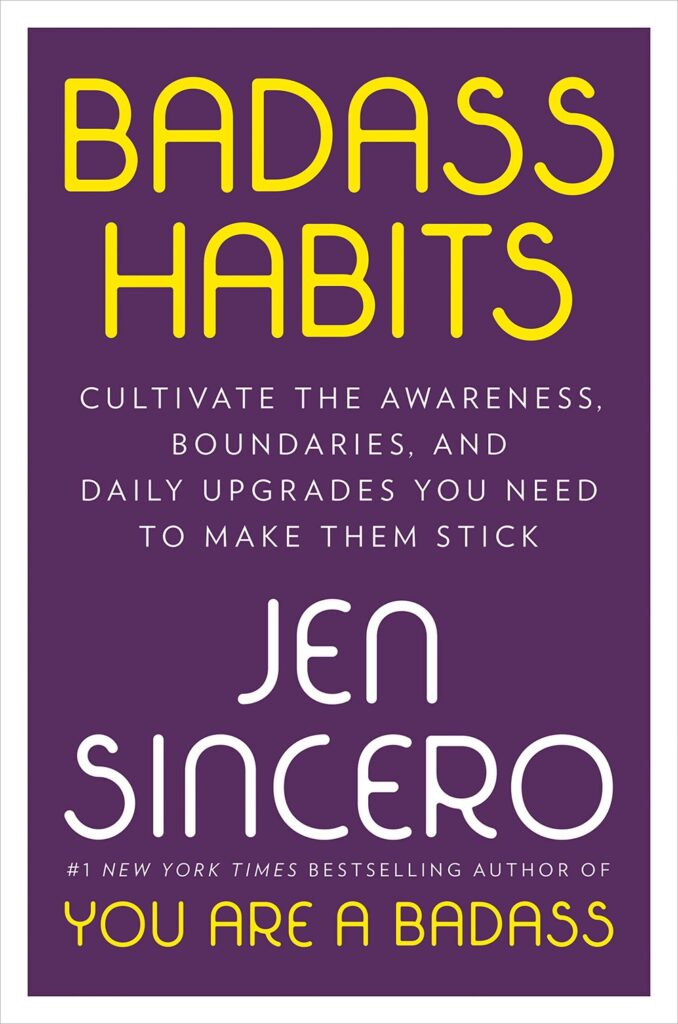Sharing my learnings from the book, Badass Habits by Jen Sincero
Badass Habits by Jen Sincero
Badass Habits is a eureka-sparking, easy-to-digest look at how our habits make us who we are, from the measly moments that happen in private to the resolutions we loudly broadcast (and, erm, often don’t keep) on social media. Habit busting and building goes way beyond becoming a dedicated flosser or never showing up late again–our habits reveal our unmet desires, the gaps in our boundaries, our level of self-awareness, and our unconscious beliefs and fears. Badass Habits features Jen’s trademark hilarious voice and offers a much-needed fresh take on the conventional wisdom and science that shape the optimism (or pessimism?) around the age-old topic of habits. The book includes enlightening interviews with people who’ve successfully strengthened their discipline backbones, new perspective on how to train our brains to become our best selves, and offers a simple, 21 day, step-by-step guide for ditching habits that don’t serve us and developing the habits we deem most important. Habits shouldn’t be impossible to reset–and with healthy boundaries, knowledge of–and permission to go after–our desires, and an easy to implement plan of action, we can make any new goal a joyful habit.

- a habit is a routine, action, or behavior you engage in over and over again. Essentially, it’s what you do when running on autopilot.
- Habits work by connecting a trigger to a response, then connecting that response to a reward.
- the first step in making any change to your routines is to identify them. To do that, reflect on your actions, as well as the thoughts and feelings associated with them.
- Once you become aware of the sequences behind your habits, you can consciously alter them. This requires redefining your identity to fit the new habits you want.
- Once you truly see yourself as a different person, your unconscious sequences will fall in line more easily.
- Building new habits is all about picking an identity and sticking to the actions and behaviors that that identity entails. This process requires that you, and no one else, remain in control of your time, energy, and emotions. If you always let outside forces influence how you act and feel, you’ll never stay true to the goal you’re pursuing. That’s why it’s essential to establish boundaries.
- This means consciously deciding how to interact with the world around you. To do this, reflect on what limits you think are necessary to pursue your goals. Consider what you will and won’t do, what treatment you will and won’t accept from others, and what factors are actually in your control. A good way to practice is to start small.
- You’re more likely to step up to a challenge when you follow your heart.
- Take a moment to write down a list of habits you’d like to develop or change. Now, consider why you’ve chosen these habits.
- The truth is, your actions are driven by both rational thought and emotional energy. Any new practice is more likely to become routine and automatic when you’re motivated by both reason and passion.
- when you’re choosing which habits to pursue, it’s important to pick ones that are actually connected to who you want to be.
- Sometimes, slipups and setbacks can make you doubt that you really want a new habit. It’s important to remember that these things happen.
- you can keep to your new routine for 21 days, there’s a good chance it’ll become second nature.
- It’s best to start your 21-day sprint to a new you by setting a mantra. On the first day of your new routine, think of a few positive statements that reaffirm your desires. Whenever you start doubting your intentions or abilities, repeat this mantra to refocus your effort.
- Next, keep track of your progress and give yourself rewards. Sticking to a habit is much easier when you acknowledge every small success. Make a ritual of it. Just don’t let your reward cancel your efforts
- After the first couple of days, your focus may be waning. So take steps to smooth out the process. Anticipate and eliminate any triggers that may throw you off track.
- And remember, keep a positive attitude and be grateful for your success. Whenever you’re struggling, remind yourself how far you’ve come. If you mess up or miss a day, don’t fall into despair. Instead, acknowledge the mistake and redouble your efforts. Developing a new habit isn’t easy, but keep trying, and it will happen.
- cultivating new habits is about self-improvement, not being perfect. So as you strive to be your ideal self, treat yourself with compassion, and don’t forget the things that make you happy
- As you work through your 21 days of habit-forming, remember why you’ve chosen to improve your habits in the first place. The goal isn’t to become a perfect machine, but to create positive routines that allow you to be more of who you are.
- So even as you work on establishing new patterns, always honor your authentic self. Continue loving what you love, laughing at what you find funny, and forgiving yourself for your small flaws and foibles.
- Most importantly, treat yourself with compassion.


Leave a Reply